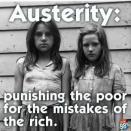From Lars Syll Pretending that the distribution of income and wealth that results from a long set of policy decisions is somehow the natural workings of the market is not a serious position. It might be politically convenient for conservatives who want to lock inequality in place. It is a more politically compelling position to argue that we should not interfere with market outcomes than to argue for a system that is deliberately structured to make some people very rich while leaving others in poverty. Pretending that distributional outcomes are just the workings of the market is convenient for any beneficiaries of this inequality, even those who consider themselves liberal … But we should not structure our understanding of the economy around political convenience. There is no way of
Topics:
Lars Pålsson Syll considers the following as important: Uncategorized
This could be interesting, too:
tom writes The Ukraine war and Europe’s deepening march of folly
Stavros Mavroudeas writes CfP of Marxist Macroeconomic Modelling workgroup – 18th WAPE Forum, Istanbul August 6-8, 2025
Lars Pålsson Syll writes The pretence-of-knowledge syndrome
Dean Baker writes Crypto and Donald Trump’s strategic baseball card reserve
from Lars Syll
Pretending that the distribution of income and wealth that results
from a long set of policy decisions is somehow the natural workings of the
market is not a serious position. It might be politically convenient for
conservatives who want to lock inequality in place. It is a more politically
compelling position to argue that we should not interfere with market
outcomes than to argue for a system that is deliberately structured to make
some people very rich while leaving others in poverty.
Pretending that distributional outcomes are just the workings of the market is convenient for any beneficiaries of this inequality, even those who consider themselves liberal …
But we should not structure our understanding of the economy around political convenience. There is no way of escaping the fact that
levels of output and employment are determined by policy, that the length
and strength of patent and copyright monopolies are determined by
policy, and that the rules of corporate governance are determined by policy. The people who would treat these and other policy decisions determining the distribution of income as somehow given are not being honest. We can debate the merits of a policy, but there is no policy-free option out there.This may be discomforting to people who want to believe that we
have a set of market outcomes that we can fall back upon, but this is the
real world. If we want to be serious, we have to get used to it.
 No one ought to doubt that the idea that capitalism is an expression of impartial market forces of supply and demand, bears but little resemblance to actual reality. Wealth and income distribution, both individual and functional, in a market society is to an overwhelmingly high degree influenced by institutionalized political and economic norms and power relations, things that have relatively little to do with marginal productivity in complete and profit-maximizing competitive market models.
No one ought to doubt that the idea that capitalism is an expression of impartial market forces of supply and demand, bears but little resemblance to actual reality. Wealth and income distribution, both individual and functional, in a market society is to an overwhelmingly high degree influenced by institutionalized political and economic norms and power relations, things that have relatively little to do with marginal productivity in complete and profit-maximizing competitive market models.
